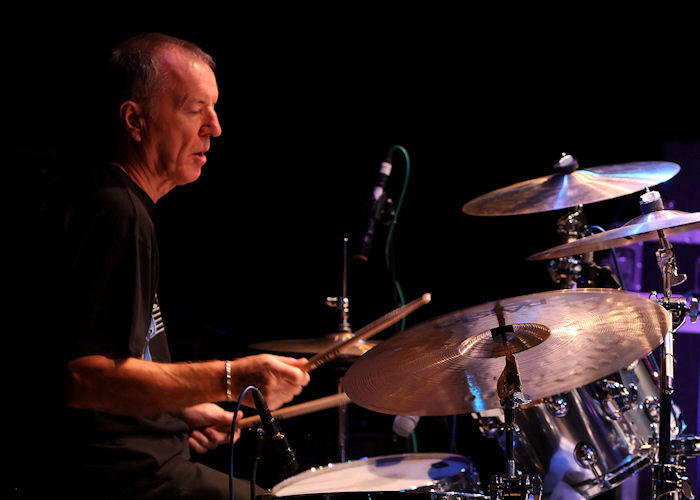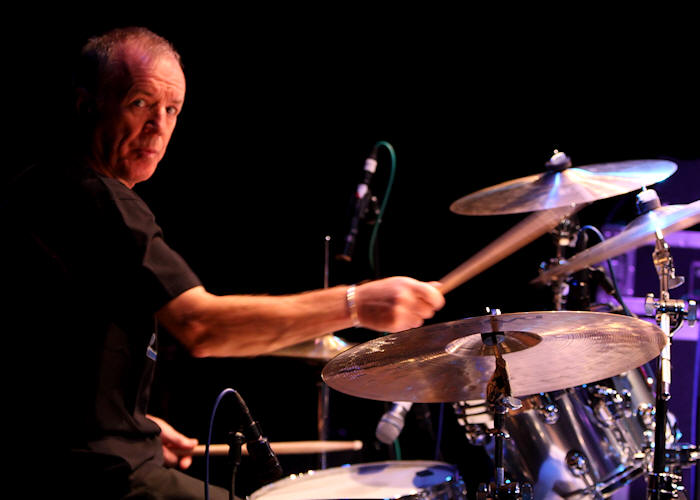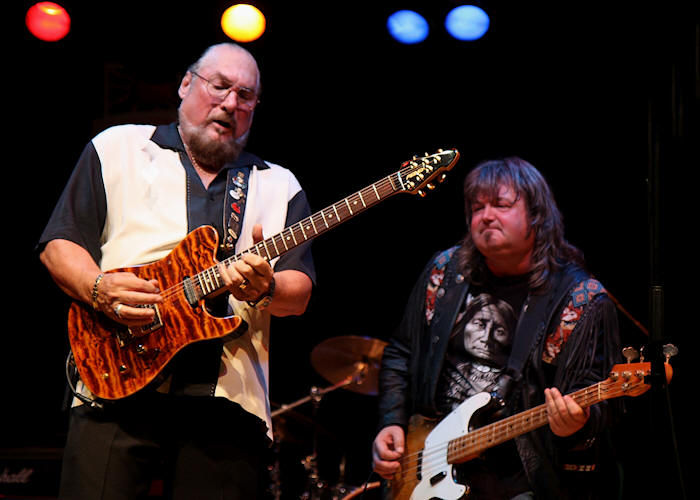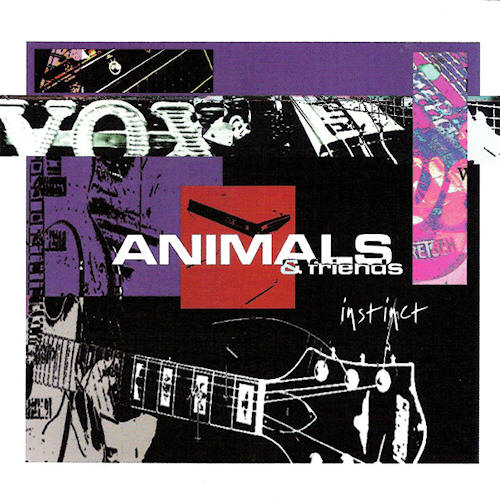
Painting © 2004 Loz
Arkle
Website
© Copyright 2000-2011 Alan White - All
Rights Reserved
Site optimised for Microsoft Internet Explorer
Early Blues Interview
|
|
_________________________________________________________________________ I had the pleasure of interviewing John at the end of the Animals & Friends tour with Steve Cropper: Alan: What are your first musical memories growing up in Gateshead? John: I remember sitting on my auntie’s knees as she was singing “Give me 5 minutes more, give me 5 minutes more”. I was a little toddler and that was a popular song the time. Other memories are just records that were in the house; that was anything from Bing Crosby, Al Jolson, Fats Waller, a British guy called Sid Phillips in a post-war early trad jazz outfit. All sorts of odd stuff really. I was the youngest of four kids so I got to hear all sorts of stuff. My sisters were fond of musicals, Oklahoma and stuff like that. My brother tended to be touching on jazz so that was the Fats Waller and the Sid Phillips stuff and my dad liked Bing Crosby. One of my sisters was married to a guy who was an Al Jolson Fan. Alan: Did you come from a musical family - is there a long musical heritage? John: No, I'm the only one that actually made a career of it. We all had to do piano lessons when we were kids. It was completely the wrong thing to do to make us have piano lessons. The old theory was that if you can play piano you'll never be short of money. It was a generation that had just gone through the depression and World War II and that was the way things were. Alan: Did you always want to become a musician? John: Yeah, it was one of my ambitions early on to become a musician. My first instrument was a trumpet so my first influences were jazz, initially trad jazz and then I got into modern jazz. But when I played drums rather than trumpet I never felt really confident enough, because the people I was influenced by and admired were jazz drummers like Elvin Jones and Art Blakey and people like that. There was no way I was going to be that good so I never considered myself good enough to aspire to that kind of thing. But somehow I just accidentally fell into Rock 'n' Roll and R&B. Alan: I believe you met up with Eric Burden at college, tell me about those times and why you switched to become a drummer.
Alan: What first attracted you to the blues and what does the blues mean to you? John: Whilst appreciating trad jazz there was what you would call 'classic blues' like Bessie Smith and people like that. Then, once you get into rock 'n' roll, again similarly with jazz as it was with rock 'n' roll, where you start looking behind and asking "where did that come from?". One of the first rock 'n' roll records I bought was 'Shake Rattle and Roll' but I pretty soon discovered that Bill Haley didn't write it, he nicked it off Big Joe Turner and then you start thinking "well, what else is back there" and you start digging and finding Muddy Waters and guys like that. Then there were contemporary players in America - black guys who were playing rock 'n' roll were a lot different to the white guys you know. You get Elvis Presley doing Hound dog, then you start thinking "where did that come from?" and it's Big Mama Thornton and so on. Then you listen to Chuck Berry and Little Richard and Fats Domino you think "Oh, I'll just go that way!". Alan: Whilst you have documented the history of The Animals so eloquently on The Animals & Friends website, inevitably I would like to ask a few questions about the band and the music. Firstly tell me in your own words about the original incarnation of The Animals, when was it, where were you, who was in the line-up and what did you play?
Then that fell apart and I left art school and got myself a job as a technical illustrator at the De Havilland aircraft company down in Hatfield, Hertfordshire. So I left Newcastle and the Pagans band more or less folded. But I couldn't stand it, I was in the wrong place in this drawing office, rows and rows of big drawing boards, all of us drawing the insides of Comet aircraft. After a few months I thought "To hell with this, I'm going back to Newcastle". I immediately hooked up with Eric and we asked Alan Price to join us in a new band. We found this album by Joe Turner called 'Boss of the Blues' which was Kansas City urban blues with Pete Johnson playing really powerful boogie on keyboard. We thought that was good so we started calling ourselves the Kansas City Five and lifted a couple of numbers off that album and added it in with the rest of the mix. Then we added some brass and became the Kansas City Seven. We had a tenor player and an alto player and a trumpet player, then two trumpet players, so it became the Kansas City Several, based on however many that turned up. The Kansas City Five had got a regular gig and Alan was poached by a band called the 'Kon Tors' and in that band was Chas Chandler on bass, so Alan went with in them because they were making more money than us, The Kansas City Five then just fell apart because we needed that keyboard input. So I got a job in a nightclub with a bow tie, playing cocktail jazz and backing cabaret artists singing the likes of Moon River with piano, bass and drums. In the space of about a year Alan had got a bit bored with playing in the Kon Tors because they just did covers of American hits basically. He formed this splinter band with Eric, Chas on bass, a guy called Nigel Stanger on tenor sax and Barry Preston on drums. They didn't have a regular guitarist at the time. So I was walking down the street in Newcastle one day. I'd been in this nightclub job for about 10 months and Chas stop me in the street (who I knew anyway) and said "Just the man, we've got this drummer in the band, a guy called Barry Preston whose driving everybody crazy, he's not right musically and is getting up everybody's nose personally as well". So he said "Do you want to come and join us?" and I thought, with being down in the basement playing cocktail jazz for 10 months I'd lost touch with what was going on in the dirty end of town; the Downbeat Club, the Club AGoGo. I didn't realise what they'd been up to and I said "That's all right I've turned professional now", as I quit the little day job I had. I said I'm on 15 quid a week which was all right at that time, this was 1963. Chas said "Well we're doing that, 14-15 quid a week" and I said "What, playing good stuff?" and he said "Yeah!" and I said "Oh, OK I'm in". I said I had a week's holiday in Belgium or France. This was only a week or two away, so I said "How about when I'm back in the September?" and he said "That'll do, we'll make that the date for our first gig". So I went down to the Downbeat Club, it was an all-nighter - it started at midnight - and the place was rammed. They'd built up this following in R&B. The Rolling Stones were coming off at that time and there was a huge groundswell of interest in R&B rather than just pop and The Beatles. There was this kind of dirtier scene going on, and we didn't realise there were people all over the country doing exactly the same thing. So I walk in, sets me kit up and says "Hello". By this time Nigel Stanger the tenor player had gone to Oxford University, he was following an academic life. They said we've got this new guitarist called Hilton Valentine. No, it's his real name, and that was the first time I met Hilton. We just got up and played a three-hour set. In those days we just knew so much material. All Eric had to do was call the number and we could play it. So that was the first time the five people were on stage together who became the Animals, but at that time were called the 'Alan Price Rhythm and Blues Combo'.
John: Well, we became the house band, the Downbeat session at midnight was an extra. It was like an all-nighter, the main gig was the Club AGoGo in Newcastle. Mike Jeffrey founded it, owned it and ran it, and he had us on Tuesday, Wednesday, Thursday, Friday, Saturday, then we'd go down to the Downbeat Club for the all-nighter. We used to play two three-hour sets on a Saturday night. We became the house band and became massively popular as the local band. We also got to be support for guest people like John Lee Hooker and Sonny Boy Williamson. Alan: That was quite something for a young band, how was the experience? John: We were so used to each other, with those two guys especially, who didn't play like anybody else in the world. They didn't play a set structure, you would go a couple bars over or a couple bars less and you just had to go with them you know, and Sonny Boy Williamson was just evil. He would pull an harmonica out and call a key and play a completely different key - a subtle switch. Great fun and education as well. There were also visiting bands, we would play a set, then they would do their set and we would play at the interval or something like that. One night it was Graham Bond, the Graham Bond Organisation. Brilliant band, Graham on keyboards, Jack Bruce on bass guitar, Ginger Baker on drums, and Dick Heckstall-Smith on sax. When we did our bit Graham got up and had a blow with us because he played alto sax as well as Hammond organ, a good jazz musician he was. He got talking to Mike Jeffrey and said "You want to get these guys down to London because it's all going off". Its 1963, the Beatles were already knocking the doors down and Mike thought he would sign us up with a management agreement. He wasn't going to lose us! What happened was Graham got Mike down to London and introduced him to Ronan O'Rahilly, who later founded Radio Caroline, but he had a club in the West End call the Scene Club, just up near the Windmill in a basement. He also introduced him to Georgio Gomelsky who was managing the Yardbirds at that time and had been involved with the Rolling Stones earlier, then the Yardbirds had taken over the Stones circuit because the Stones have started to move up a rank. Mike came back to Newcastle just before the end of 63 and he said we've got a good deal, the Yardbirds are going to come up here and do your gigs for 10 days or something and we are going to go down there and do the Yardbirds gigs in and around London; gigs like the Ricky Tik clubs and Eel Pie Island. Also we were going to have a base at Ronan O'Rahilly's Scene Club in Piccadilly. He said "Oh, by the way, you've got a new name. Graham Bond had suggested that you want to get rid of that 'Alan Price Rhythm and Blues Combo' name. You want something more snappy, so your called 'The Animals' now!"
John: I don't know, I could never understand it because that Scene Club was a Mod hangout. When we first arrived there in the afternoon to setup, have a bit of a rehearsal and then off to get something to eat, we came back and the yard outside the gig was packed with scooters, Lambrettas and Vespas all gleaming chrome, mirrors and aerials. We'd never seen anything like it because it was purely a London phenomenon at the time. Also, when they danced it was exactly what became rhythm and soul [Northern Soul], that kind of very slick dancing, they were doing it then in the Scene Club. These were Mods and they were listening to all this kind of imported records. Guy Stevens was the disc jockey and he was bringing all this imported American stuff in, and we were listening to this and watching these kids dancing, and we were thinking they are going to hate us. But we got up and we played and they loved us. I met a guy just two or three years ago who had been one of the Scene Club Mods and he said "You were our band!" Alan: I believe Animals gigs were often frequented by other artists such as Chris Farlow & The Thunderbirds, Georgie Fame & The Blue Flames, Zoot Money & The Big Roll Band, and John Mayall & The Bluesbreakers. Was this reciprocal and are you still in touch? John: Oh yeah, it was very incestuous you know. You had the Marquee, you had the Flamingo, the Scene Club and others. Georgie Fame was more or less a resident at the Flamingo. There was Chris Farlowe and Zoot Money, they were all regulars at the Flamingo and the Marquee. Alan: Do you still see much of them? John: Oh yes, Zoot's played with as a lot of times when Mick Gallaher is doing his stint with the Blockheads. We did a tour with Georgie Fame just three or four years ago which was very good. They were great because everybody was digging each other, there was mutual admiration absolutely, yeah. They were good days. Alan: Who were the biggest influences in your music? John: I think probably Ray Charles in those days became a huge influence. I loved that kind of stuff he was doing.
John: Well to be quite honest, the first time I ever heard it was on Bob Dylan's first album the very first album - all acoustic. Then I learned that it had been around for donkeys years and nobody knew who originally wrote it. I'm pretty sure regardless of all the stories it was the first time any of us had heard it. We liked it, we loved that album. We knew there was something significant that had just come into the world with Bob Dylan's first album. I knew there was something special - the rising sun stood out. Since then it's been sung by Led Zeppelin, Josh White, all sorts of people around the world. Alan: Most people think it refers to a New Orleans brothel or a jailhouse or even a slave pen on a plantation, have you any thoughts on that? John: I've got no idea and I don't think anyone else has really, it's all conjecture. One of the things we had to do though was rewrite the lyrics. When we recorded it we knew there was no way it was ever going to get played on the radio singing about the house of prostitutes, not in those days anyway!
John: I know, it's because they're about life you know. They're not pop songs, they're not la, la, la songs. They are songs about the dark side of life, 'We Gotta Get Out of This Place', 'It's My Life'. 'We Gotta Get Out of This Place' is about a guy who's going to be a stud, he has to , to get some money so him and his bird can get out of where they are. Alan: It was also the US Armed Forces anthem during the Vietnam war. John: It was yeah, apparently it was in the forces charts for three years. Even now when we play, you get a lot of young kids going to our shows and they all know the words. Apparently it's what all the schoolkids sing at the end of term or when leaving school altogether: 'we gotta get out of this place'. Alan: How strong was the Blues influence in the classic Animals hits? They're not pop songs are they.
Alan: Which is your favourite Animals song? John: I don't know, I've never been embarrassed by anything we've done. I suppose it would have to be 'House of the Rising Sun', because it was such a life changing thing. One minute we were five working-class Geordie lads just having a nibble at the charts with 'Baby Let Me Take You Home' and the next minute we're jetting off to America with a number one. It had an enormous effect on us, and apart from that, it's a bloody good song. I still think it's the definitive version, in electric terms anyway.
Alan: Looking back on your career, what are your fondest memories? John: Fondest memories? I don't know. I used to love the Newcastle scene in the early days before we went to London. Going back to five working-class Geordie lads in those days in 1964 you didn't go to America unless you were rich, a film star, a big businessman or whatever. It's not like today when you just jet across for a holiday in Florida or whatever. All our influences growing up as teenagers in post-war Britain, which was a bit grim, was American movies and American music and books. We read Faulkner, Steinbeck, JD Salinger and people like that. So to find us heading across the big pond to land in New York, it was like another planet in those days. When we were in a sort of grubby dirty place like Newcastle used to be in those days, it was soot Black, and you couldn't get a drink after 10 o'clock. You'd seen those movies where people would take a couple of drags of a cigarette and stub it out and you'd think how can you do that, that's a cigarette. They just lived a completely different kind of lifestyle compared with our kind of life, so to be flying out there, arriving in New York, and to be escorted into Manhattan with a motorcycle escort was just something else.
Alan: How did 'Animals & Friends' come about, who was the catalyst in bringing the band together? John: That's an odd one that, because Chas in the early 90s had moved back from London to Newcastle and resettled with his wife Madeleine and raised a family and everything. He was still involved in music, but after Slade he never really managed to get another band that was going to be an international hit. He did try but somehow he never got the right band or the right person. He more or less said "I've had enough of this" and moved back up to Newcastle. Madeleine was from the North-east as well and she wanted to be close to the family, so Chas went along with that. Chas went to see a band that Hilton was in, a local band called the Alligators. The singer was a guy called Robert Kane who didn't look at all like Eric but when he sang, they did a couple of Animals numbers 'We Gotta Get Out of This Place' and 'Don't Let Me Be Misunderstood'. Chas had commented it was remarkable how like Eric he sounded on those particular numbers. He said, "You want to do something about that, develop along those lines more". Just about the same time Peter Barton, who was an agent - who is now our lead singer and bass player, but at that point he was trolling around looking for the remains of 60s bands that he could build into a new act but using the old name and perhaps a couple of original members. He connected up with Hilton and Chas and Peter said "I could do something with this if you develop the Animals idea but you really, really need at least one of the original members in the band to make it work. Chas said "Well, phone Johnny up, give him a shot". Hilton phoned me up and I said "Well, I'm not sure about this". I wasn't sure that I wanted to start working again with Hilton, as he could be a bit difficult. But anyway I phoned Chas and said "I hear you been hanging around with Hilton a bit", because it was thought he used to hate his guts back then. He said "I know, but he's changed, he's a different character now, so I've been hanging out with him a bit, it's a pretty good band. I said "Well, what do you think?". He said "Give it a shot, it can either work or it's not going to work". So I phoned Hilton back and said "I'll give it a shot then". So I turned up and again it was one of these situations where the drummer they had wasn't really right for the job. I remember being very proud at some point after the Animals when Chas said "When Johnny Steel left the band all the swing when out of it, and it just became another rock band". I think that's what they didn't have with this other drummer which I was able to provide. I came in and that's when we started, in 1993.
Alan: Animals & Friends are now on their second tour with Steve Cropper, how did that originally come about? John: Well again, it's Peter Barton, his philosophy is they can only say yes or no. He was looking for this concept of Animals and Friends giving us the freedom of inviting people to join us as guests with the band. I don't know how he picked on Steve Cropper, but somehow he did. He just kept phoning up and saying "Do you want to come over and work with us?" and Cropper turned him down several times until eventually he wore him down. This was about two or three years ago. So he came over and we did about 10 gigs and it was great fun. We got on well and somehow the combination of the Animals repertoire and the Stax music worked. Steve has got such a repertoire, hundreds and hundreds of songs. Anyway, we had this good little tour and he went back to the States and we thought we'll probably never see him again. But then he contacted Pete and said "Are we going to do anything this year?". So Pete set to work and put about 20 gigs together and we're just coming to the end of it now. We've been having a good time. Alan: You have an amazing tour schedule into 2012, doesn't it get a bit tiring after all these years? John: Well, this is the longest spell for a while, it's going to be five weeks and I only got home two nights in the five weeks. In 1997 I think it was, or 1998, we did 3 1/2 months, a month in Poland, then we went on to Southeast Asia, then we ended up in the States for six weeks touring with the Yardbirds, and that was 3 1/2 months continuous on the road. That was the longest I've done ever! But no, I don't get tired of it. Sometimes I think I'm looking forward to getting into my own bed but if it was really bothering me I wouldn't do it. Once you get the first few gigs under your belt and you get into that kind of rolling routine you're okay, then suddenly it comes to an end and you say we've done it, we've done all those gigs and it's done. Alan: John, thank you so much.
John:
You're very welcome. Further reading: Evolution of The Animals (Animals and Friends Website) The Animals - The Complete Guide (Wikipedia Book) Origin of the song 'House of The Rising Sun' (Wikipedia)
Mods - a London 'subculture' phenomenon of the 60s
(Wikipedia)
Check out Animals and Friends with Steve Cropper -
Colne 2011
Return to
Blues Interviews List |








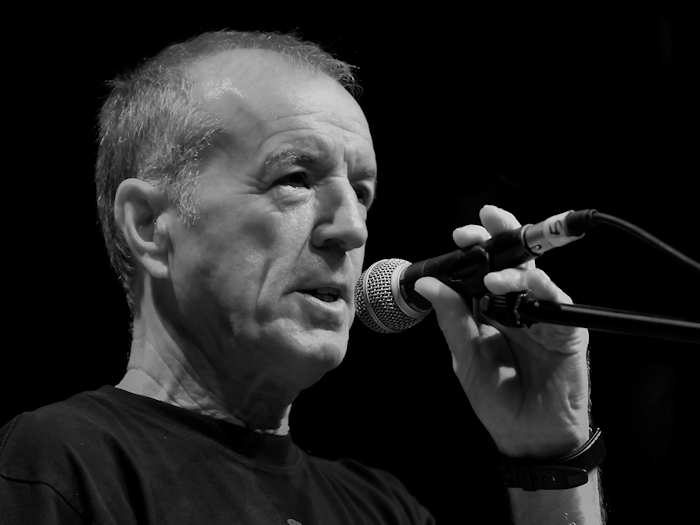
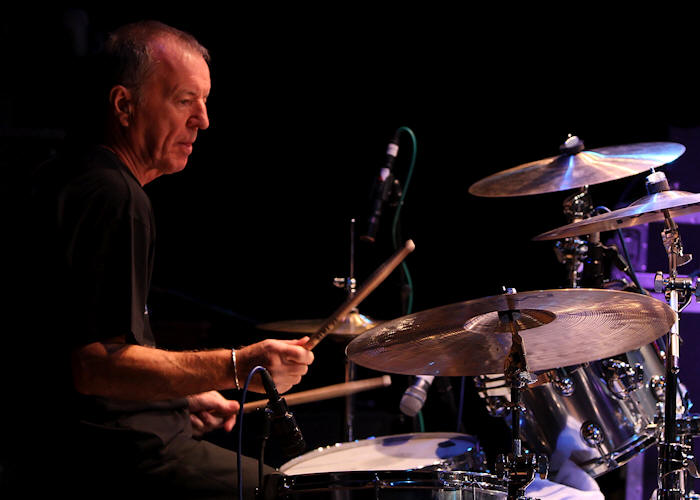
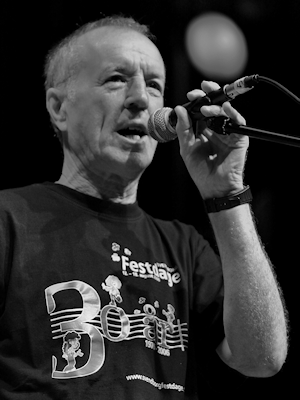 John: It
was 1956 and I had already been playing a little, and I could carry a
few trad tunes in B flat from about 14, so it was when I got to art
school as a 15 or 16-year-old that I first met Eric. Both Eric and me
were dropouts, everybody in the class was a dropout basically, rather
than get a job. It was so easy to get into art school in those days. You
had to have a little bit of talent but it was a great option rather than
working for a living, going to art school. I was playing trumpet and
Eric and me got on like a house on fire in the first-year class and he
said I've got some friends who have started to form a little band. It
was just at that point on the cusp where up until rock 'n' roll first
showed, trad jazz was the dance music for teenagers and that's what you
played. So that's why I took up trumpet; I just loved the music anyway.
I pretty soon realised that behind the British jazz that we were hearing
there was the original stuff and I pretty soon discovered Louis
Armstrong, the 1925 Classics, The Hot Five and Jelly Roll Morton, Bix
Beiderbecke and people like that. I fell in love with it. Again it was
just a question of having a bash at it, not just listening to it, just
try and play it. So the first band I got in [The Pagan Jazzmen] was with
Eric playing trombone and with two mates of his,
John: It
was 1956 and I had already been playing a little, and I could carry a
few trad tunes in B flat from about 14, so it was when I got to art
school as a 15 or 16-year-old that I first met Eric. Both Eric and me
were dropouts, everybody in the class was a dropout basically, rather
than get a job. It was so easy to get into art school in those days. You
had to have a little bit of talent but it was a great option rather than
working for a living, going to art school. I was playing trumpet and
Eric and me got on like a house on fire in the first-year class and he
said I've got some friends who have started to form a little band. It
was just at that point on the cusp where up until rock 'n' roll first
showed, trad jazz was the dance music for teenagers and that's what you
played. So that's why I took up trumpet; I just loved the music anyway.
I pretty soon realised that behind the British jazz that we were hearing
there was the original stuff and I pretty soon discovered Louis
Armstrong, the 1925 Classics, The Hot Five and Jelly Roll Morton, Bix
Beiderbecke and people like that. I fell in love with it. Again it was
just a question of having a bash at it, not just listening to it, just
try and play it. So the first band I got in [The Pagan Jazzmen] was with
Eric playing trombone and with two mates of his, 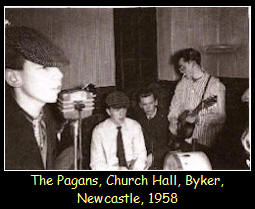
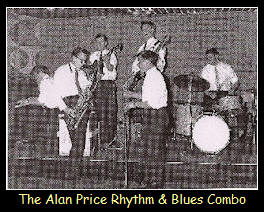
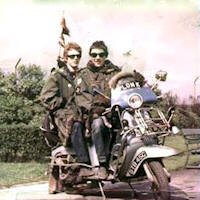 Alan:
When
The Animals set up their base in London, I read the Mods [a purely
London 'subculture' phenomenon at the time] became an important fan base
in the city, why do you think the Mods took to the Animals in such a big
way?
Alan:
When
The Animals set up their base in London, I read the Mods [a purely
London 'subculture' phenomenon at the time] became an important fan base
in the city, why do you think the Mods took to the Animals in such a big
way? 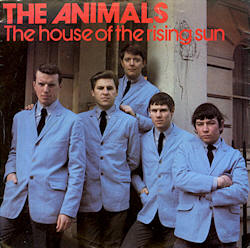 Alan:
What
is your view on the origins of the song ‘House of the Rising Sun’?
Alan:
What
is your view on the origins of the song ‘House of the Rising Sun’? 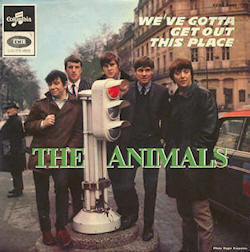 Alan:
What
do you think are the reasons for the continuing popularity of so many
Animals songs? They've been going so long and are still loved.
Alan:
What
do you think are the reasons for the continuing popularity of so many
Animals songs? They've been going so long and are still loved. 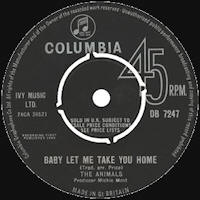 John: No,
we did a lot of kind of bluesy stuff on B-sides and album tracks because
that's where the heart was. To some extent we were going by the need for
more commercial aspects with our choice of numbers, but at the same time
Mickey Most never tried to force us to do anything we didn't want to do,
and we wouldn't have stood for it anyway. If we didn't like it we didn't
do it. In fact the only reason we did 'Baby Let Me Take You Home' as our
first single was from one of Mickey suggestions. He would go to the
States and come back with an armful of stuff and say this is good for
you. It was a sort of pop version of 'Baby Let Me Follow You Down' from
Bob Dylan's first album and we said if it's good enough for Bob, it'll
do for us.
John: No,
we did a lot of kind of bluesy stuff on B-sides and album tracks because
that's where the heart was. To some extent we were going by the need for
more commercial aspects with our choice of numbers, but at the same time
Mickey Most never tried to force us to do anything we didn't want to do,
and we wouldn't have stood for it anyway. If we didn't like it we didn't
do it. In fact the only reason we did 'Baby Let Me Take You Home' as our
first single was from one of Mickey suggestions. He would go to the
States and come back with an armful of stuff and say this is good for
you. It was a sort of pop version of 'Baby Let Me Follow You Down' from
Bob Dylan's first album and we said if it's good enough for Bob, it'll
do for us. 